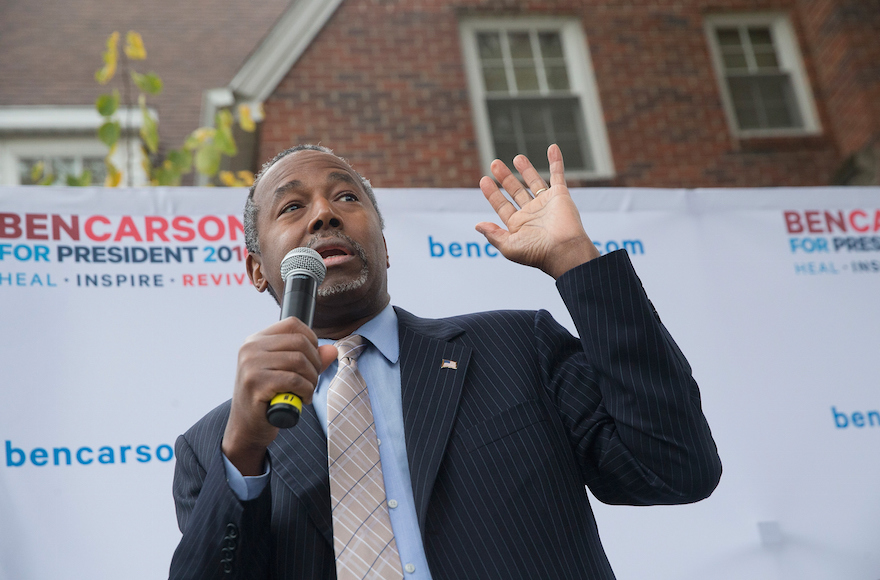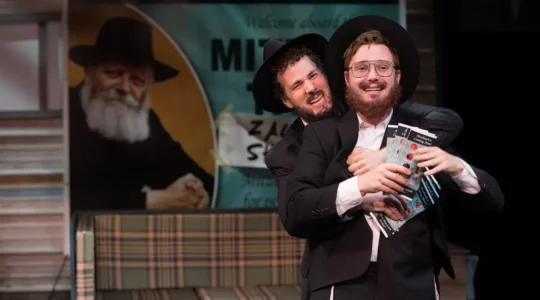NEW YORK (JTA) – When Joe Lieberman became the first observant Jew with a reasonable chance at being president – after Al Gore named him his vice presidential running mate in 2000 – he faced a host of questions about how his Sabbath observance might impact his presidential duties.
Now that Ben Carson, a Seventh-day Adventist, has emerged at the top of the polls in the Republican presidential primary, he’s facing similar questions about his religion.
So far, Carson’s faith — which, like Judaism, celebrates the Sabbath on Saturday and abjures eating the non-kosher animals listed in the Book of Leviticus — hasn’t been an impediment to his campaign.
READ: Ben Carson blames gun control for the Holocaust
The neurosurgeon-turned-candidate doesn’t seem to be a Sabbath observer in the strictest sense: He has held campaign rallies on Saturday and made Saturday stops on book tours. But Carson says he tries to respect the day of rest.
“Sabbath is still a precious day for us. We go to church as often as we can,” he told the Adventist News Network in 2013. “Even if we’re on the road we treat it as a different day than all the others.”
Carson is a member of the Spencerville Seventh-day Adventist Church in Spencerville, Maryland. As a Seventh-day Adventist, Carson adheres to a little-understood Protestant religious group that emerged in mid-19th century America and now has some 1.2 million members nationwide and more than 18 million around the world.
While the religion shares some commonalities with Judaism, Adventists believe the second coming of Jesus may be imminent. The Adventist church also focuses on health and wellness, and members are encouraged, but not required, to forgo alcohol, tobacco and meat.
Carson is on a mostly vegetarian diet, but he does eat milk and egg products and occasionally chicken.
More relevant politically, Carson frequently cites his faith as the reason for his policy positions. On taxation, for example, Carson has proposed a tithing system.
READ: Ben Carson stands by U.S.-Nazi Germany comparison
“When I pick up my Bible, you know what I see? I see the fairest individual in the universe, God, and he’s giving us a system. It’s called tithes. Now we don’t necessarily have to do it 10 percent, but it’s the principle,” Carson said in a 2013 speech at the National Prayer Breakfast. “You make $10 billion, you put in a billion, you make $10, you put in one. Of course, you’ve got to get rid of the loopholes.”
Like many other Christian candidates, he also cites religion for his opposition to abortion, including in cases of rape or incest (though not if the mother’s life is in jeopardy).
“All you have to do is go and look up the many stories of people who have led very useful lives who were the result of rape or incest,” he told NBC’s “Meet the Press” this week.
Carson, who cites Jesus as his role model, also has some pronounced views about Americans of other faiths. He suggested in September that he’d have trouble with a Muslim in the White House, saying that any Muslim who became president would have to reject certain tenets of Islam that are incompatible with the presidency.
“I would have problems with somebody who embraced all the doctrines associated with Islam,” Carson explained on CNN’s “State of the Union.” “If they are not willing to reject sharia and all the portions of it that are talked about in the Koran — if they are not willing to reject that, and subject that to American values and the Constitution, then of course, I would.”
He also believes Jews shouldn’t take offense if someone wishes them a “Merry Christmas.”
“People are afraid of saying ‘Merry Christmas’ at Christmastime,” he said in his 2013 National Prayer Breakfast speech. “It doesn’t matter if the person you’re talking to is Jewish or whether they’re any religion. That’s a salutation of greeting, of goodwill. We’ve got to get over this sensitivity.”
More controversially, Carson suggested in a new book and in interviews in early October that gun control was partially responsible for Hitler’s slaughter of Europe’s Jews, allowing the Nazis to “carry out their evil intentions with relatively little resistance.” His comments came as part of his reaction to the deadly mass shooting at Umpqua Community College in Roseburg, Ore., after which Carson argued that better armed citizens, rather than gun control, is the best way to stop such mass killings.
Several weeks later, Carson defended his comments, saying on “Meet the Press,” “I’ve heard from many people in the Jewish community, including rabbis, who said, ‘You’re spot on. You are exactly right.’”
Like many devout believers of all faiths, Carson attributes his successes in life to God.
“There’s no question God sets these things up. My whole life, I feel, has been orchestrated by him,” Carson said in 2013. “We always have to remember that no matter what’s going on, no matter how much of a spotlight we have, that all of that comes from God and everything we do should reflect glory on his name.”
JTA has documented Jewish history in real-time for over a century. Keep our journalism strong by joining us in supporting independent, award-winning reporting.






